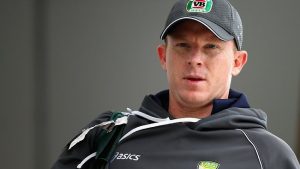Rogers’ omission is an eye to the future, but not as you’d expect
Date: June 12, 2015 / Posted by Glenn Mitchell
 For Chris Rogers, the current tour of the Caribbean has been a waste of time. He was struck on the helmet by a local net bowler two days before the opening Test in Dominica and was ruled out of the match.
For Chris Rogers, the current tour of the Caribbean has been a waste of time. He was struck on the helmet by a local net bowler two days before the opening Test in Dominica and was ruled out of the match.
Yesterday he was ruled out of the second and final Test in Jamaica. The Test at Kingston, starting tonight Australian time, will commence eleven days after he was hit. One wonders whether a few years ago his absence from tonight’s Test would have occurred, and indeed, whether he would have even missed the first.
Cricket, worldwide, had a salient reminder in November of the damage a cricket ball can do when Test batsman Phil Hughes was struck in the head during a Sheffield Shield match at the SCG. It was a freak accident but the aftermath was devastating.
It had a profound effect on all and sundry – both cricket fans and those who had little interest in the sport. I am sure the aftermath of the Hughes tragedy is having an effect in regard to the non-selection of Rogers, and well it might.
A dedicated doctor traveling with the Australian team is a recent occurrence. Previously, on occasions, one had accompanied the team to India but in the main medical issues were left to the team physiotherapist in concert with local medical authorities.
Last summer the team travelled Australia with renowned sports physician, Dr Peter Bruckner who has previously been employed by the Liverpool and Melbourne Football Clubs. He is an expert in his field. And it is Brukner who has been making the call on Rogers’ health in the Caribbean.
This summer Cricket Australia will adopt a new policy with respect to players who are struck in the head.
The Rogers case is the first time the new policy has been implemented. Previously it rested largely with the player concerned to make the call on whether he was fit to play. Ahead of the opening Test in Dominica, a day after being hit, Rogers took part in a protracted conversation on the outfield with Brukner, captain Michael Clarke and coach Darren Lehmann, arguing his case for selection.
However, having already confided in Brukner that he was still having bouts of dizziness, he was told he was not eligible for selection. A week on the status quo remains.
Cricket has been late to the party in how it approaches concussion incidents with the likes of the AFL and NRL having removed it from the players’ hands a while back.
Whilst Rogers is still reporting any degree of after effect he should not be permitted to play. The call should be made by a qualified medico after he has assessed and spoken to the player.
The world of sports medicine is still learning about the effects of trauma on the brain as a result of hits or falls.
A member of my family, a former Olympic cyclist, had several heavy falls during her career and has suffered neurological issues well into her retirement Whilst her condition is not severe she has been assured by doctors that her current-day issues are as a result of cumulative concussions during her racing career.
Shockwaves went through the NFL world in April when a federal judge made a landmark decision approving a financial plan in the wake of numerous suits raised by former players with respect to post-career neurological problems.
It is expected that up to 6000 of the 20,000 retired NFL players will suffer some form of brain-related condition in the years ahead as a result of concussions suffered during their playing days – namely Alzheimer’s disease and moderate dementia. Individual awards could be as high as US$5m for those in their thirties who are diagnosed with Parkinson’s disease or Lou Gehrig’s disease.
It is estimated that over the next 65 years the potential payout incurred by the NFL could reach US$1bn. There is little doubt that lawyers and players in other codes around the world will use the US example in a bid to extract compensation from their former employers.
While the science world is still undertaking research into the effects that bouts of unconsciousness or hits to the head can have on brain function it is imperative that all sports err on the side of caution.
One of the principal reasons given for not making a sport like boxing illegal is the fact that it would likely go underground.
It is a sport with one of the strongest historical connections to gambling and it is doubtful that making it illegal would see it simply dissolve into the ether. Whilst it is sanctioned it is administered by various geographic commissions.
It is through these commissions that boxers are medically assessed after fighting, and should they suffer a knock out, they are banned from entering the ring again for a designated period of time.
Removing the sports legitimacy would also remove the requisite medical oversight that must be in place to protect the participants.
Sport has a finite period in every participant’s life. Our lives themselves are finite as well.
It is imperative that every sport does whatever it can to ensure the gap between the two is as large as possible and the quality of life of sportspeople in retirement is at rich as it can possibly be.
Hence, Chris Rogers will be watching on tonight in Jamaica. And those who made that decision should be applauded.
First published on The Roar – theroar.com.au – on 11 June 2015, soliciting 17 comments






